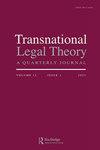跨国审计师,当地工作场所和法律
Q2 Social Sciences
引用次数: 1
摘要
全球供应链的审核员在确定制造工厂遵守跨国标准以及国家和国际劳动法的意义方面发挥着重要作用。他们在由地方和国家法律管辖的工作场所的劳工的当地背景和旨在管理全球供应链的私人标准的跨国背景之间的界面上发挥这一作用。本文利用跨地区合法性的概念来探讨审计师如何发展和部署他们的权威和技术专长,以解释有关遵守全球供应链中法律和私人规范的问题。它说明了审计师如何改变遵守法律要求的含义,并在这样做的过程中,在经济全球化背景下,对工人安全可接受和不可接受的风险类型进行区分。本文章由计算机程序翻译,如有差异,请以英文原文为准。
Transnational auditors, local workplaces and the law
ABSTRACT Auditors of global supply chains play an influential role in determining what it means for manufacturing facilities to comply with both transnational standards as well as national and international labour laws. They exercise this role at the interface between the local context of labourers in a workplace governed by local and national laws, and the transnational context of private standards intended to govern global supply chains. This article utilises the concept of translocal legality to explore how auditors develop and deploy their authority and technical expertise to interpret questions about compliance with legal and private norms in global supply chains. It illustrates how auditors transform what it means to be compliant with legal requirements, and in doing so creates a distinction between acceptable and unacceptable types of risk to workers’ safety in the context of economic globalisation.
求助全文
通过发布文献求助,成功后即可免费获取论文全文。
去求助
来源期刊

Transnational Legal Theory
Social Sciences-Law
CiteScore
2.10
自引率
0.00%
发文量
7
期刊介绍:
The objective of Transnational Legal Theory is to publish high-quality theoretical scholarship that addresses transnational dimensions of law and legal dimensions of transnational fields and activity. Central to Transnational Legal Theory''s mandate is publication of work that explores whether and how transnational contexts, forces and ideations affect debates within existing traditions or schools of legal thought. Similarly, the journal aspires to encourage scholars debating general theories about law to consider the relevance of transnational contexts and dimensions for their work. With respect to particular jurisprudence, the journal welcomes not only submissions that involve theoretical explorations of fields commonly constructed as transnational in nature (such as commercial law, maritime law, or cyberlaw) but also explorations of transnational aspects of fields less commonly understood in this way (for example, criminal law, family law, company law, tort law, evidence law, and so on). Submissions of work exploring process-oriented approaches to law as transnational (from transjurisdictional litigation to delocalized arbitration to multi-level governance) are also encouraged. Equally central to Transnational Legal Theory''s mandate is theoretical work that explores fresh (or revived) understandings of international law and comparative law ''beyond the state'' (and the interstate). The journal has a special interest in submissions that explore the interfaces, intersections, and mutual embeddedness of public international law, private international law, and comparative law, notably in terms of whether such inter-relationships are reshaping these sub-disciplines in directions that are, in important respects, transnational in nature.
 求助内容:
求助内容: 应助结果提醒方式:
应助结果提醒方式:


